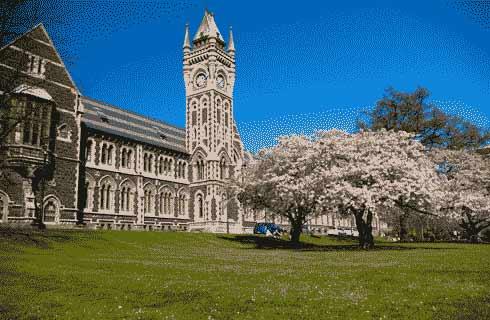自然资源管理理学学士-野生动物和渔业
Bachelor of Science in Wildlife and Fisheries

学历文凭
Bachelor Degree

专业院系
Faculty of Environment

开学时间

课程时长

课程学费

国际学生入学条件
For admission from a GCE system (or equivalent) a minimum of two Advanced (A) level subjects and three Ordinary (O) level subjects must be completed with an overall GPA of C or higher in order to be considered for admission. All A level subjects presented for admission must have a grade of at least C. Students may substitute two Advanced Subsidiary (AS) level subjects for one A level.
TOEFL (Test of English as a Foreign Language) score of 90 or higher in the internet-based test, with not less than 20 in each of the Reading, Listening, Writing or Speaking components, score of at least 230 in the computer-based test or at least 570 in the paper-based test,
IELTS (International English Language Testing System) Academic score of at least 6.5 overall, with not less than 6.0 in any of the four modules
Duolingo English Test score of 105 or higher
MELAB (Michigan English Language Assessment Battery) score of at least 80, with a minimum of 3 on the Speaking Rating Scale
IDP—雅思考试联合主办方

雅思考试总分
6.5
了解更多
雅思考试指南
- 雅思总分:6.5
- 托福网考总分:90
- 托福笔试总分:570
- 其他语言考试:PTE (Pearson Test of English - Academic) Overall score of 65, with not less than 60 in each of reading, writing, listening, and speaking.
CRICOS代码:
申请截止日期: 请与IDP顾问联系以获取详细信息。
课程简介
The BSc Wildlife and Fisheries degree at UNBC is administered by the Ecosystem Science and Management Department and is one of very few degrees of its kind in Canada.<br><br>The degree provides students with a solid foundation in wildlife and fisheries biology with considerable indoor and outdoor laboratory experience. It also exposes students to an integrated approach to resource issues that confront today's professionals. A student graduating from this degree has a sound theoretical and practical background for pursuing post-graduate studies as well as embark directly into the Wildlife or Fisheries professions.<br><br>Gain a solid foundation in wildlife and fisheries biology and develop an integrated approach to resource issues facing today’s wildlife and fisheries professionals. Combine the theoretical and practical lab experience that provides you with the background to pursue post-graduate studies and public- and private-sector employment in the wildlife or fisheries professions.<br><br>Learn about natural resources management, chemistry, ecology, biology, genetics, physics, soil science, forest plant systems and botany in your first two years.<br><br>Delve into a wide range of topics in your third and fourth years:<br><br>ornithology and mammalogy<br>animal diseases and parasites<br>environmental impact assessment<br>ethics<br>Indigenous perspectives on land and resource management <br>wildlife, fisheries and watershed management
相关申请
 预科
预科 奖学金
奖学金 实习机会
实习机会 在校学习
在校学习 跨境学习
跨境学习 校园授课-线上开始
校园授课-线上开始 在线/远程学习
在线/远程学习
学校排名

世界排名801
数据源:泰晤士高等教育世界大学排名
关于北不列颠哥伦比亚大学

作为加拿大最好的本科大学之一(麦克林大学排名,2024年)和顶级研究型大学(Research Infosource加拿大研究型大学50强,2022年),北不列颠哥伦比亚大学(UNBC)不仅是一所大学,更是一个紧密团结的社区,教职员工在提供个性化学习体验的同时努力追求卓越的学术成就。UNBC是备受国际学生青睐的学校。校训''En Cha Huná''的意思是''尊重一切形式的生命'',反映出这所大学的学术自由精神、尊重他人和愿意接受不同的观点。UNBC被誉为加拿大的''绿色大学'',这与它在教育、研究、社区和全球影响方面''引领可持续未来''的新愿景高度契合。位于不列颠哥伦比亚省北部的UNBC不仅拥有壮丽的景观,还能提供以就业为中心且注重实践的包容性和个性化教育,旨在培养未来的领导者。教学工作并不局限于课堂,各种各样的课程均由屡获殊荣的学术人员教授。UNBC是一所热情洋溢的大学,拥有友好、包容的支持性学习环境。学生可以获得丰富多彩的体验,与同学和教授密切合作,参与各种研究项目,得到广泛的支持,并通过实习机会提升他们的就业能力。UNBC的所有学生都有大量机会享受加拿大所提供的一切。乔治王子城主校区的学生可以看到令人惊叹的落基山脉,也能自由选择参加各种户外活动。这里是整个地区最大的城市,全年300天有阳光照耀,每个人都能在这里找到适合自己的东西。这里有热闹的餐厅、众多公园、两支少年冰球队、繁荣的文化和艺术生活,到处都是湖泊,附近还有高山滑雪场。
本校相关课程

Graduate Certificate in Leading for Learning
学历文凭
Graduate Certificate
开学日期
课程费用总额


社会工作硕士
学历文凭
Masters Degree
开学日期
课程费用总额


心理学哲学博士
学历文凭
Ph.D.
开学日期
课程费用总额


心理学理学硕士
学历文凭
Masters Degree
开学日期
课程费用总额


政治学文学硕士
学历文凭
Masters Degree
开学日期
课程费用总额


Master of Science in Nursing (Thesis)
学历文凭
Masters Degree
开学日期
课程费用总额

其他相关课程

自然资源管理哲学博士
 曼尼托巴大学
曼尼托巴大学学历文凭
Ph.D.
开学日期
课程费用总额


自然资源管理硕士
 曼尼托巴大学
曼尼托巴大学学历文凭
Masters Degree
开学日期
课程费用总额


流行病学哲学博士
 麦吉尔大学继续教育学院
麦吉尔大学继续教育学院学历文凭
Ph.D.
开学日期
课程费用总额


自然资源科学学士
 汤姆逊大学
汤姆逊大学学历文凭
Bachelor Degree
开学日期
课程费用总额


资源管理学士
 纽芬兰纪念大学
纽芬兰纪念大学学历文凭
Bachelor Degree
开学日期
课程费用总额


流行病学人口动态哲学博士
 麦吉尔大学继续教育学院
麦吉尔大学继续教育学院学历文凭
Ph.D.
开学日期
课程费用总额


























